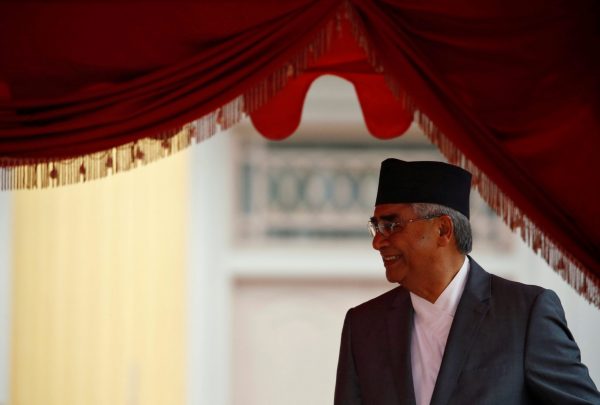While a smooth power transition marks a new dawn in the political history of Nepal, Deuba faces a number of challenges both at home and abroad. The most immediate domestic challenges will be ensuring the peaceful conduct of the last phase of local elections in September and amending the constitution to demarcate a new province to meet the demands of the Madhesis (people of the Southern Plains of Nepal) and other ethnic groups. And on the external front, Deuba faces the challenge of either choosing sides or attempting to balance between China and India.
Relations between Nepal and India reached a new low during 2015-16 under then prime minister K. P. Sharma Oli, after he criticised India for allegedly supporting the Madhesis who were agitating against the newly implemented constitution. The incident was followed by a number of diplomatic jams, including recalling the Nepalese ambassador to India and cancelling a scheduled maiden goodwill visit by Nepal’s president to New Delhi.
But the new coalition under Oli’s successor Dahal opted for a corrective ‘rapprochement’ towards India to ease the tensions that were left behind by the previous administration. At the same time, without yielding to Indian pressure, Dahal managed to reboot ties with China.
The first ever joint military exercise between the Nepal Army and the People’s Liberation Army took place in March 2017. Importantly, this exercise was conducted against the backdrop of the ongoing maiden visit of Nepal’s president to India but managed to defy scepticism as it was agreed upon during Oli’s term in office. Although India opted not to comment, a wave of paranoia emerged in the Indian media.
On 12 May, during his last legs in office, Dahal also managed to officially sign a memorandum of understanding with China to cooperate on the ambitious Belt and Road Initiative (BRI), after facing public criticism for the delay. Interestingly, it was just two days before the Belt and Road Forum took place in Beijing. The last minute move worked in Nepal’s favour — a larger time lapse between the signing and the Forum would have allowed a panicked India to reach out to Nepal.
While India has expressed concerns that certain parts of China’s BRI plans breach Indian sovereignty, Nepal remains neutral on siding with any party. During a closed-door session in Delhi, a Nepalese diplomat conveyed that ‘being a landlocked country between India and China, Nepal aspires to benefit from both rather fall prey to their face-offs and BRI is a great opportunity altogether’.
Under Deuba, Nepal continues to keep cooperation with China intact. Nepal is currently working to finalise the draft of the Transit Transport Agreement (TTA) to gain access to Chinese ports, which will enable Nepal to trade with third-party countries and transit to Europe through land routes. The TTA was signed in March 2016 during Oli’s visit to China. Though India also plans to improve transportation links with Nepal by constructing a railway link across the India-Nepal border, its development is relatively snail paced.
Nepal also plans to subvert its technological reliance on India, especially in the telecom sector. Nepal will have access to Chinese internet services and bandwidth supply — which is presently only provided by India — from August 2017.
In return for the welcoming space in Nepal, China does not intend to interfere in Nepal’s internal affairs. This is creating a popular perception in Nepal that China honours Nepal’s sovereignty more than any other country, which is not the case with India. For instance, China applauded the new constitution and provided material support for conducting local elections, contrary to India’s unwelcoming response.
So by remaining neutral on the internal affairs of the other, be it the ongoing border tensions between China and India or constitutional amendment in Nepal, Nepal and China continue to maintain uninterrupted engagement.
Left with a short administration spell and domestic challenges at hand, Deuba is unlikely to slow down any of the deals with China that were established by his predecessors. But as Nepal engages with China, it needs to remain cautious of Chinese intentions and aware of the economic dependency that will emerge out of BRI and other such deals. The ongoing trilateral border face-off between India, Bhutan and China must also serve as a precaution for Nepal, as its geographic location is not too different from that of Bhutan.
A wise strategy towards India and China that balances both sides might help Nepal to avoid India’s traditionally assertive stance while continuing to benefit from growing engagement with China.
Rishi Gupta is a PhD candidate at the Center for South Asian Studies, Jawaharlal Nehru University, New Delhi.


For the first time former PM Dahal and PM Deuba kept the promise of sharing the musical chair of Prime Minister of Nepal as agreed between them. This is a commendable act of trust that Prachanda has displayed this time. It is difficult to find trust factor in political landscape of Nepal otherwise. It is not entirely true that China does not interfere in internal affairs. Under the influence of China Nepal has deported several Tibetan asylum-seekers and travelers to China over the years and Nepal government has not treated Tibetans as legitimate asylum-seekers or refugees wanting to go to Dharmasala in Northern India or stay in Nepal. In several instances Tibetans were beaten-up by police and handed back to Chinese soldiers at the border. This policy has not changed ever since Nepal dethroned the royals and has been glaringly occurring since democratically elected political parties took the seat of political power in Kathmandu.
I am in complete agreement with all of your comments. The naivety of so many countries in the Asian area is a shock. After currency manipulation, disregard of the World Court ruling against it’s actions (fake islands) in the SCS, interference in Myanmar, Hong Kong, the Philippines, etc. — and yet many, especially in Australia. heralding China’s BRIC enticement. It’s either from greed, fear, or stupidity. I can’t decide.